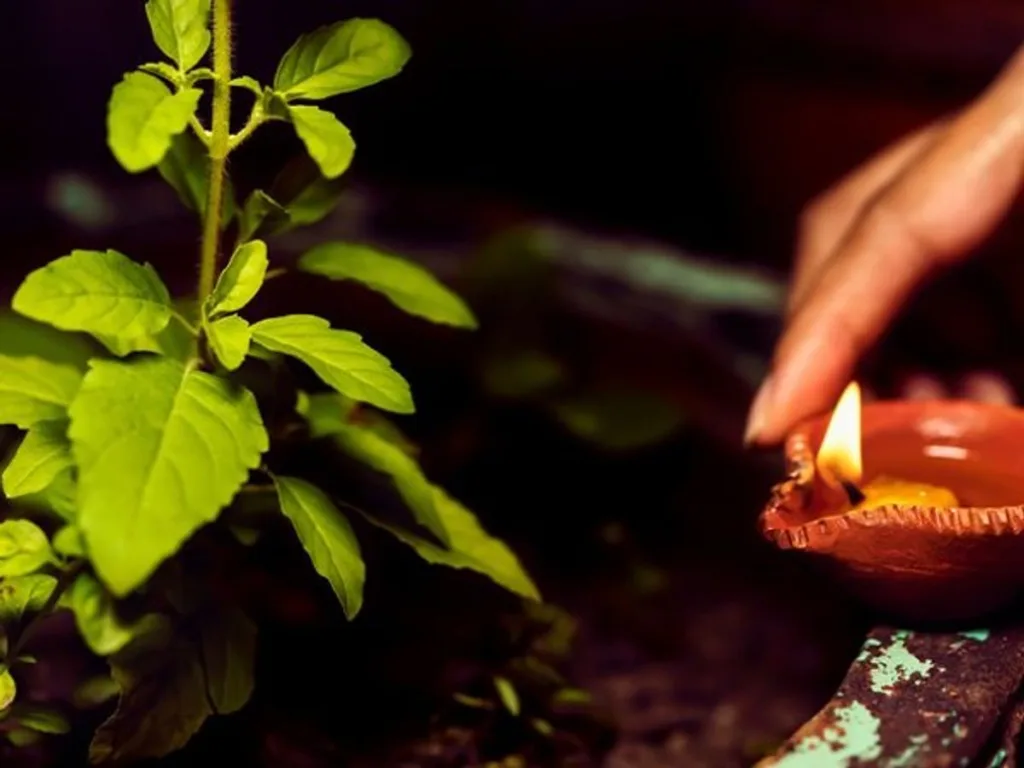Tulsi Pujan Diwas, also known as Tulsi Vivah, is a significant day in the Hindu calendar dedicated to the worship of the sacred basil plant, Tulsi (Ocimum tenuiflorum). This auspicious day holds profound cultural and religious importance in India, weaving together a tapestry of tradition, spirituality, and botanical reverence. In this comprehensive article, we will explore the history, rituals, cultural significance, and enduring legacy of Tulsi Pujan Diwas.
The Sacred Basil:
In Hinduism, tulsi, also called basil in English, is a highly esteemed herb that is sometimes referred to as the “Queen of Herbs” or the “Holy Basil.” Its delicate blossoms and thin, fragrant leaves are reflected in its botanical name, Ocimum tenuiflorum. In Hindu households, tulsi is considered more than just a plant; it is thought to represent the spirit of Lord Vishnu’s wife, the goddess Lakshmi.
Historical and Mythological Roots:
The reverence for Tulsi dates back to ancient Indian scriptures and mythology. According to Hindu mythology, Tulsi is believed to have emerged from the ocean during the churning of the milk ocean (Samudra Manthan). As the story goes, Tulsi is considered the earthly manifestation of a celestial maiden who was devoted to Lord Vishnu. Pleased with her devotion, Lord Vishnu transformed her into the sacred basil plant.
Read More
- Santa Claus: Things You Need to Know About the Jolly Icon of Joy and Generosity
- Boxing Day: Things You Need to Know About Traditions, History, and Celebrations
Tulsi is connected to the tale of Lord Krishna in another mythical account. It is stated that Krishna changed into a stone after being expelled from Dwarka. It is stated that Tulsi, who was enamoured with Krishna, embraced the stone form, signifying her unending oneness with the god.
Tulsi Pujan Diwas Rituals:
Tulsi Pujan Diwas is observed on the Ekadashi (eleventh day) of the bright half of the Kartik month in the Hindu calendar. Devotion, prayers, and elaborate ceremonies are characteristics of the rituals associated with Tulsi Pujan Diwas.
1. Tulsi Vivah (marriage):
A symbolic marriage ceremony known as Tulsi Vivah is performed on this day. The sacred basil plant is ceremonially married to Lord Vishnu or his earthly manifestation, the Shaligram stone. This ritual signifies the union of the divine with the earthly, reflecting the deep spiritual connection between Tulsi and Lord Vishnu.
2. Preparations for the Wedding:
In the days leading up to Tulsi Pujan Diwas, households make elaborate preparations for the “wedding.” The tulsi plant is adorned with traditional ornaments, sarees, and flowers. A small structure resembling a wedding pavilion, called the Tulsi Vrindavan, is constructed to house the plant.
3. Ceremonial Bathing:
On the day of Tulsi Pujan Diwas, the Tulsi plant is given a ceremonial bath (abhishek) with water, milk, curd, honey, and ghee. Devotees believe that this ritual purifies the plant and brings auspiciousness to the household.
4. Offerings and Prayers:
Devotees offer traditional sweets, fruits, and other items to Tulsi as a symbol of devotion. The chanting of prayers and hymns to Lord Vishnu and Tulsi is present during the ceremony.
5. Lighting of lamps:
Lamps are lit around the Tulsi plant, signifying the dispelling of darkness and the triumph of light. The glow of the lamps is believed to attract positive energy and divine blessings.
6. Distribution of Prasad:
After the puja, devotees partake in the distribution of prasad (offered food) as a symbol of sharing the divine blessings with the community.
Cultural Significance:
Tulsi Pujan Diwas is deeply embedded in the cultural fabric of India and holds multifaceted significance.
1. Spiritual Connection:
The worship of Tulsi is considered a means of attaining spiritual upliftment. The plant is believed to purify the surroundings and create a spiritually charged environment.
2. Health Benefits:
Apart from its religious significance, Tulsi is renowned for its medicinal properties in Ayurveda. It is believed to have numerous health benefits and is used in traditional medicine for its anti-inflammatory, antioxidant, and antibacterial properties.
3. Symbol of Purity:
Tulsi is seen as a symbol of purity and devotion. Its fragrant leaves are offered in various rituals, and its presence is believed to ward off negative energies.
4. Environmental Harmony:
The reverence for Tulsi is not confined to individual households. Many communities promote the planting of tulsi in public spaces, contributing to environmental harmony and the well-being of the community.
5. Cultural Expressions:
Tulsi Pujan Diwas is not only a religious observance but also an occasion for cultural expression. In various regions, it is celebrated with music, dance, and the retelling of mythological stories related to Tulsi.
Tulsi in Indian Literature:
Tulsi is mentioned in numerous ancient Indian texts and scriptures. The “Tulsi Ramayan,” a version of the Ramayana composed by the sage Tulsidas, is considered a significant literary work that emphasizes the spiritual significance of Tulsi. The plant is also celebrated in various devotional hymns and bhajans dedicated to
Share this content:

